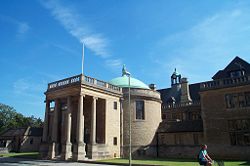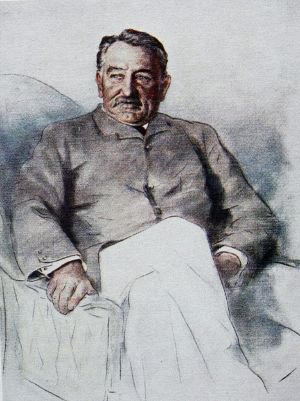Rhodes Scholarship
The Rhodes Scholarship is an international award for study at the University of Oxford and was the first large-scale program of international scholarships,[1] founded in 1902 by the will of Oxford alumni Cecil John Rhodes. Rhodes Scholars may study any full-time postgraduate course offered by the University, whether a taught Master’s program, a research degree, or a second undergraduate degree(senior status).
Overview
The University of Oxford (usually abbreviated as Oxon. for post-nominals), located in the city of Oxford, England, is the oldest university in the English-speaking world. The University of Oxford is a member of the Russell Group of research-led British universities, the Coimbra Group (a network of leading European universities), the League of European Research Universities, and is also a core member of the Europaeum. Academically, Oxford is consistently ranked in the world's top ten universities.[2]For more than a century, it has served as the home of the prestigious Rhodes Scholarship, which brings highly accomplished students from a number of countries to study at Oxford as postgraduates; these students often return to their home countries to pursue leadership positions in academia, business, or politics.
The Scholarship is for two years in the first instance, though may be held for one year only; applications for a third year are considered during the course of the 2nd year.
University and College fees are paid by the Rhodes Trust. In addition, Scholars receive a monthly maintenance stipend to cover accommodation and living expenses. Although all scholars become affiliated with a residential college while at Oxford, they also enjoy access to Rhodes House, an early 20th century mansion with numerous public rooms, gardens, a library, study areas, and other facilities.
History
Cecil John Rhodes was a British-born South African businessman, mining magnate, and politician. He was an ardent believer in colonialism and was the founder of the state of Rhodesia, which was named after him. Rhodesia, later Northern and Southern Rhodesia, eventually became Zambia and Zimbabwe respectively. He is also especially known today for the scholarship that bears his name. Although Rhodes remained a leading figure in the politics of southern Africa, especially during the Second Boer War, he was dogged by ill health throughout his relatively short life. Rhodes died in 1902, and was considered at the time one of the wealthiest men in the world.
In his first will (before he had any real money), Rhodes wanted to create a secret society that would bring the whole world under British rule.[3] The exact wording of the will is:
- To and for the establishment, promotion and development of a Secret Society, the true aim and object whereof shall be for the extension of British rule throughout the world, the perfecting of a system of emigration from the United Kingdom, and of colonisation by British subjects of all lands where the means of livelihood are attainable by energy, labour and enterprise, and especially the occupation by British settlers of the entire Continent of Africa, the Holy Land, the Valley of the Euphrates, the Islands of Cyprus and Candia, the whole of South America, the Islands of the Pacific not heretofore possessed by Great Britain, the whole of the Malay Archipelago, the seaboard of China and Japan, the ultimate recovery of the United States of America as an integral part of the British Empire, the inauguration of a system of Colonial representation in the Imperial Parliament which may tend to weld together the disjointed members of the Empire and, finally, the foundation of so great a Power as to render wars impossible, and promote the best interests of humanity.
In his last will and testament, he provided for the establishment of the Rhodes Scholarships. The scholarship program enabled students from territories under British rule, formerly under British rule, or from Germany, to study at the University of Oxford.This legacy originally provided for scholarships for the British colonies, the United States, and Germany. These three were chosen so that "an understanding between the three great powers will render war impossible."
Rhodes, who attended Oxford University, chose his alma mater as the site of his great experiment because he believed its residential colleges provided the ideal environment for intellectual contemplation and personal development.
Rhodes' vision for the scholarships did not hold long; his bequest was whittled down considerably in the first decades after his death, as various scholarship trustees were forced to pay taxes upon their own deaths. A change occurred in 1929, when an Act of Parliament established a fund separate from the original proceeds of Rhodes's will. This made it possible to expand the number of scholarships. For example, between 1993 and 1995, scholarships were extended to other countries in the European Community. However, the sentiment of exclusion remained for a long time. The elimination of the scholarships for Germany during World Wars I and II, illustrated the biased selection of the trustees. Because the Sex Discrimination Act 1975 in the United Kingdom did not affect wills, it took another Act of Parliament to change the Rhodes' will to extend selection criteria in 1977 to include women.
Standards and Administration
Rhodes' legacy specified four standards by which applicants were to be judged:
- literary and scholastic attainments;
- energy to use one's talents to the full, as exemplified by fondness for and success in sports;
- truth, courage, devotion to duty, sympathy for and protection of the weak, kindliness, unselfishness and fellowship;
- moral force of character and instincts to lead, and to take an interest in one's fellow beings.
The scholarships are administered and awarded by the Rhodes Trust which was established in 1902 under the terms and conditions of Cecil John Rhodes will. Scholarships have been awarded to applicants annually since 1904 on the basis of academic achievement and strength of character. There have been more than 7,000 Rhodes Scholars since the inception of the Trust. More than 4,000 are still living.[4]
There were originally 52 scholarships. During the ensuing 100 years, the Trustees added at one time or another approximately another 40 scholarships, though not all have continued. Some of these extended the scheme to Commonwealth countries not mentioned in the Will.[5] A more detailed allocation by region by year can be found at Rhodes Scholarship Allocations. Very brief summaries of some of the terms and conditions can be found on the Trust's web site "Rhodes Scholarship FAQ".
Currently, scholars are selected from citizens of 14 specified geographic constituencies, namely: Australia; Bermuda; Canada; Germany; Hong Kong; India; Jamaica & Commonwealth Caribbean; Kenya; New Zealand; Pakistan; Southern Africa (South Africa and neighbours Botswana, Lesotho, Malawi, Namibia and Swaziland); USA; Zambia; and Zimbabwe.[6]
Notable Rhodes Scholarship recipients
- Albrecht Graf von Bernstorff - (March 22, 1809 – March 26, 1873), admitted to the Rhodes' scholarship in 1909, was a Prussian Statesman, holding the office of Prussian Minister to England, and Foriegn Minister of Prussia.
- Edwin Hubble - (November 20, 1889 – September 28, 1953), admitted to Rhodes' scholarship in 1910, was a famed American anstronomer who profoundly changed astronomers' understanding of the nature of the universe by demonstrating the existence of other galaxies besides the Milky Way. He also discovered that the degree of redshift observed in light coming from a galaxy increased in proportion to the distance of that galaxy from the Milky Way. This became known as Hubble's law, and would help establish that the universe is expanding.
- Norman Manley - (July 4, 1893 – September 2, 1969), admitted to Rhodes' scholarship in 1914, was became one of Jamaica's leading lawyers in the 1920s. With his cousin, Alexander Bustamante, Manley was an advocate of the universal suffrage that was granted the colony in 1944.
He founded the left-wing People's National Party which later was tied to the Trade Union Congress and the National Workers' Union, together with Bustamante, in 1938, and led it in every election from 1944 to 1967. Their efforts resulted in the New Constitution of 1944, granting full adult suffrage. He served as the colony's Chief Minister from 1955 to 1959, and as Premier from 1959 to 1962. He was a proponent of the island's participation in the Federation of the West Indies but bowed to pressure to hold a referendum in 1961 which resulted in Jamaica withdrawing from the union.
Centenary degrees
In recognition of the centenary of the foundation of the Rhodes Trust in 2003, four scholars were awarded honorary degrees by the University of Oxford:
- John Brademas (Indiana & Brasenose 1950), President of New York University, U.S. Congressman (Indiana), 1959-1981
- Robert J. L. (Bob) Hawke (Western Australia & University 1953), Prime Minister of Australia, 1983-1991
- Rex Nettleford (Jamaica & Oriel 1957), Vice-Chancellor of the University of the West Indies, author, dance director
- David R. Woods (Rhodes & University 1963), Vice-Chancellor of Rhodes University
Notes
- ↑ (2008) Office of the American Secretary: The Rhodes Trust "Scholarship Information" Retrieved June 23, 2008
- ↑ Institute of Higher Education, Shanghai Jiao Tong University (2007), "Academic Ranking of World Universities 2007". Retrieved October 23, 2007
- ↑ Cite error: Invalid
<ref>tag; no text was provided for refs namedthomas - ↑ (2008) The Rhodes Trust "Brief history of the Rhodes Trust" Retrieved June 25, 2008
- ↑ (2008) The Rhodes Trust "Brief history of the Rhodes Trust" Retrieved June 25, 2008
- ↑ (2008) The Rhodes Trust "Rhodes Scholarship Constituencies" Retrieved June 25, 2008
ReferencesISBN links support NWE through referral fees
- R.I. Rotberg, "The Founder: Cecil Rhodes and the Pursuit of Power" (Oxford University Press, New York, 1988)
- Anthony Kenny (ed.), "The History of the Rhodes Trust" (Oxford University Press, Oxford, 2001)
External links
- The Rhodes Trust
- History of Rhodes Trust and Rhodes Scholarship
- Updates on Rhodes Alumni
- Scholarship and application information page
- The Australian Rhodes Scholarship
- Bermuda Selection Committee
- The Canadian Association of Rhodes Scholars
- The Rhodes Trust in Germany
- Indian Rhodes Scholarships
- Committee for Jamaica and the Commonwealth Caribbean
- New Zealand Vice-Chancellors' Committee page on Rhodes Scholarships
- New Zealand Rhodes Scholars, listed for 1903 to 1964
- The Mandela Rhodes Foundation in South Africa
- Southern African Rhodes Scholarships
- Rhodes University—South Africa
- The Rhodes Trust, USA
- Association of American Rhodes Scholars
- United States Naval Academy Rhodes Scholars
- The first in-depth study of Rhodes women
Credits
New World Encyclopedia writers and editors rewrote and completed the Wikipedia article in accordance with New World Encyclopedia standards. This article abides by terms of the Creative Commons CC-by-sa 3.0 License (CC-by-sa), which may be used and disseminated with proper attribution. Credit is due under the terms of this license that can reference both the New World Encyclopedia contributors and the selfless volunteer contributors of the Wikimedia Foundation. To cite this article click here for a list of acceptable citing formats.The history of earlier contributions by wikipedians is accessible to researchers here:
The history of this article since it was imported to New World Encyclopedia:
Note: Some restrictions may apply to use of individual images which are separately licensed.

